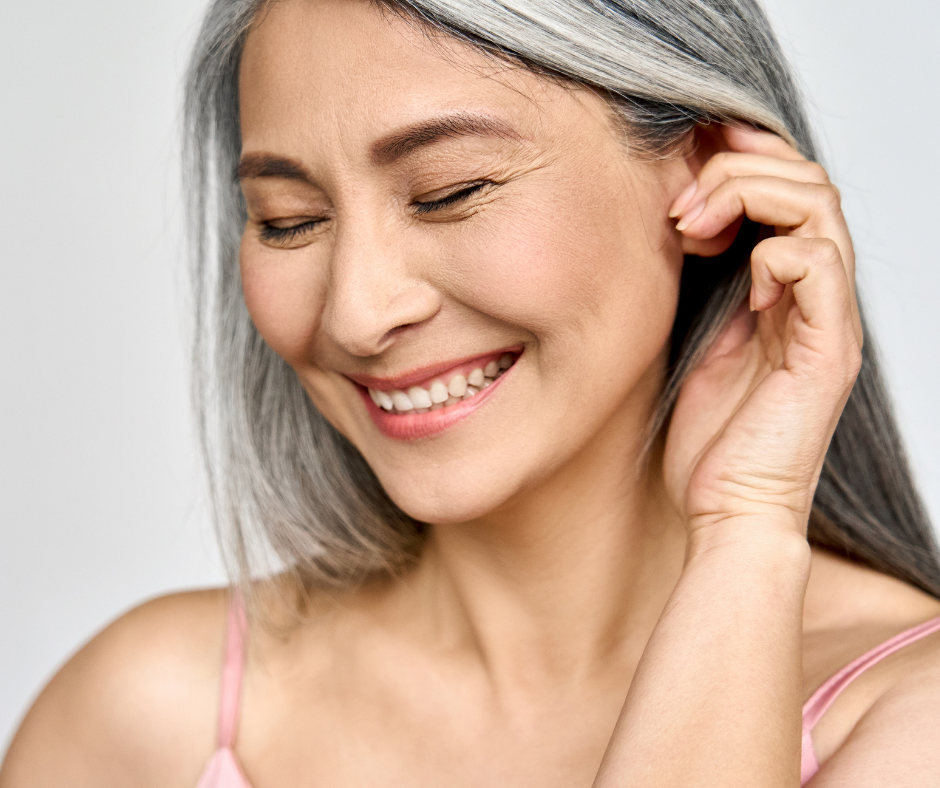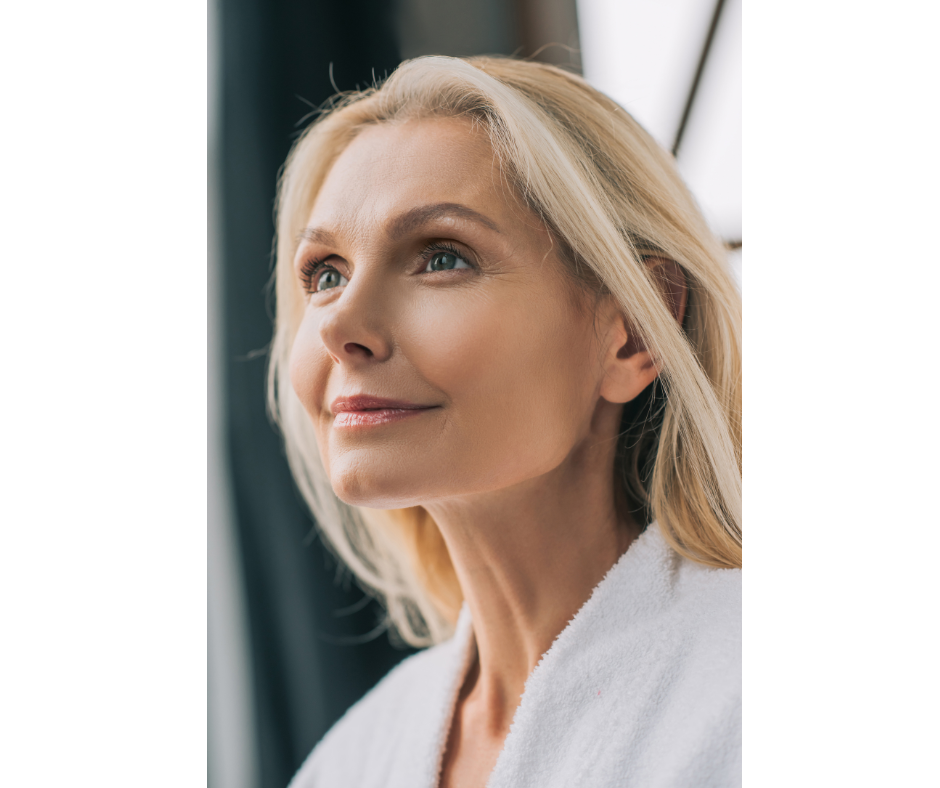How To Create A Skincare Routine For Mature Skin!
If you want information on how to care for mature skin, you've found the right place. Read our skincare basics for mature skin today!

If you're looking for a comprehensive guide to creating a skincare routine for mature skin, look no further! This article will outline everything you need to know, from the basics of skincare to more specific tips and advice written by an esthetician for mature skin. Follow along to learn more.
Mature skin can be a challenge to take care of. With years of both sun exposure, and the natural aging process, skin can become dry, wrinkled, and discolored. However, there are many ways to care for mature skin and to help keep it looking young and healthy.

Skincare Mature Skin
One of the most important things you can do for mature skin is to protect it from the sun. Sun exposure can cause wrinkles, age spots, and other signs of aging. In fact, 90% of premature skin aging has been correlated to sun exposure. Make sure to use sunscreen every day, even when it’s cloudy out.
Skin Care Routine
Another important skincare tip for mature skin is to moisturize regularly. This will help keep your skin hydrated and looking smooth. Choose a moisturizer that is oil-free so it doesn’t add extra oil to your skin.
Skin Tone
If you have wrinkles or age spots, you can try using a skin cream or serum that contains retinol or Vitamin A. These ingredients can help improve the appearance of aging skin.
Important Ingredients for Mature Skin
Some of the best ingredients for mature skin can be found in many of your favorite anti aging skincare products. The following are some of the best ingredients to look for when you are searching for a new anti aging product. This list is not all inclusive. We'll cover more details in a future post.
*Hyaluronic Acid
*Peptides
*Probiotics
*Omega's
*Retinols (Vitamin A) or Retinaldehyde/ Retinyl Palmitate
*Stem Cells
*Growth Factors
*Antioxidants
*Vitamin C
Cosmetic and Clinical Research
Cosmetic and clinical research for mature skin is important to keep up with to help keep the skin looking healthy and youthful for clients who seek professional treatments. Many factors such as sun exposure, smoking, and diet can affect the appearance of mature skin.
There are many cosmetic products and treatments available that claim to improve the appearance of mature skin, but it is important to do your research to find the best products and treatments for you. A skin therapist can help you determine which products and treatments are best suited for your individual skin type and needs.
As we age, our skin changes. It becomes thinner and less elastic. We lose collagen, which makes our skin look less firm. Our skin cells become less efficient at repairing damage. And our skin barrier weakens, leading to increased sensitivity. This is one of many reasons why it's important to adapt your skincare routine as you age.
One of the most important things you can do for mature skin is stimulate collagen production. This can be done with ingredients like retinol, vitamin C, hyaluronic acid in addition to many other ingredients. Retinols help to speed up cell turnover, while hyaluronic acid provides intense hydration. These ingredients can help to reduce the appearance of fine lines and wrinkles by plumping the skin, encouraging cell turnover, improving cellular repair and helping fibroblasts to produce collagen and elastin for skin firmness.
Skin Aging
Another important consideration for mature skin is the skin barrier. This is the protective lipid layer that keeps moisture in and irritants out. As we age, this barrier weakens, making our skin more susceptible to dryness, redness, and inflammation. Look for products that contain ceramides or other moisturizing ingredients that help to reinforce the skin barrier.
Sensitive Skin
Finally, remember that mature skin is often more sensitive than younger skin. That's why it's important to choose products that are gentle and non-irritating. Avoid fragrances and other harsh chemicals that could cause problems for sensitive skin.
By carefully choosing the right products, you can help keep your mature skin to stay healthy and looking its best. Look to add anti aging ingredients to your skin care routine. Ingredients like hyaluronic acid, vitamin c, and retinols can help to improve a variety of skin conditions including skin texture, improve collagen production, dry skin, and overall achieve healthier looking, radiant skin.
Skin Care Routine
Facial Cleanser
A skincare routine for mature skin should include a high quality facial cleanser, alpha hydroxy acids such as glycolic acid, lactic acid, mandelic acid and citric acid help to exfoliate the skin and are helpful in achieving anti aging results like a decrease of fine lines and wrinkle depth, improved pores, reduction of hormonal acne, and improved skin texture. AHA's help mature skin and dry sensitive skin types whereas beta hydroxy acids tend to better address acne to oily skin. Dry skin can also benefit from use of a cream cleanser as this can help to keep the skin barrier healthy without stripping the natural protective lipids of the epidermis.
Facial Toner
A high quality facial toner helps to rebalance the skin's pH. This is important for every skin type. Using a toner can help to restore moisture to dry skin, increase collagen production, improve and soothe sensitive skin and help improve dark spots. Some hydrating ingredients to look for will be hyaluronic acid, humectants like honey which bind water to the skin and calming ingredients like aloe, rose or lavender.
Exfoliation
Exfoliation helps to slough off dead skin cells from the outer surface of the skin. This can help to improve skin's texture, improve skin tone, improve fine lines and wrinkles, improve pores and help with product penetration of active serums. One of the other benefits is also increasing the cellular turnover rate. Most science agrees that our cellular aging begins at around age 25. For every year after that we lose about 1% a year of our collagen production and elastin production. We also lose stem cell production which is essential to our overall health and aging.
Our cellular turnover rate at age 25 is around 28 days. As we age we lose about 1% a year. By the time we reach the age of 40 it takes our bodies about 43 days for the skin cells to turnover and this continues at a 1% loss for every year that we age. One thing to note because our skin does not regenerate as it did when we are younger you may not need to exfoliate as often as you did as a teenager or young adult. Depending on your skin type you may only need to exfoliate once or twice a week, however, this should be discussed with your skin therapist and be based on your individual needs.
Mature skin can also experience moisture loss and have increased skin sensitivity. Mature skin types also lose the tone of the skin. Skin thickness can also decrease in addition to a lower production of sebaceous (oil) activity. Facial muscles can atrophy and pH changes can happen, becoming more alkaline which provides less protection to the skin. One of the most noticeable changes to the skin is the reduction of circulation. Dull appearance is common as there is reduced blood and lymphatic circulation as well as other capillary changes. In fact, circulation is a major contributor to dark circles although some people could also be genetically predisposed to this condition. Certain medications can also impact dark circles around the eyes.
Serums
Anti aging products such as antioxidant serums are very beneficial for the mature skin type. Antioxidants help to prevent future damage from free radicals. Many serums will contain the most active ingredients and are formulated to provide some of the biggest benefits to the skin. A great skin care routine may use one serum or layer serums for specific skin needs. These may include ingredients like vitamin C, vitamin A (retinol), vitamin E, stem cells, peptides, growth factors, vitamins, hyaluronic acid, aloe, and or antioxidants. You can think of this step as giving your skin the proper nutrients to create change for healthier skin.
Furthermore, an anti aging product may address things like dark spots, wrinkles, and address repairing damage from UV rays using ingredients that target specific issues. Skin conditions such as reducing redness, soothing skin, treating hormonal acne, and repair and moisturizing for improving or maintaining the skin barrier function.
Eye Cream
An anti aging eye cream or eye gel will address things like wrinkles, dark circles, dark spots and add hydration or moisture to the delicate eye area. Typically you might use an eye gel on the upper lid and eye cream or eye gel on the lower area of the eye. Not all eye creams are recommended for the upper lid but most eye gels are generally safe to use on the upper and lower eye area.
Moisturizer
Using a quality moisturizer can also help to add actives to the skin although the most important function of a moisturizer is to add moisture or hydration to the skin and provide the protective lipids for a healthy barrier. This way your skin can function at it's optimal function.
Depending on your skin type, anti aging products may use ingredients like omega's, antioxidants, natural oils, shea butter, jojoba oils, sunflower seed oil, cbd oil, creams, ceramides and emollients. You may also see actives in the formulations that also help address things like dark spots, wrinkles, refining pores, soothing irritated skin, and refining skin's texture.
Sunscreen
Sunscreen is a necessity for the maintenance and prevention of aging skin. A good skin care routine should incorporate using a high quality sunscreen with zinc oxide or titanium dioxide to protect the skin from damaging UV rays.
As we stated earlier one of the best anti aging practices is to limit sun's rays especially during the hottest times of the day and wear a broad spectrum sunscreen. Many board certified dermatologists recommend using an SPF rating of at least 30.
Anti aging products like high quality sunscreen may also include antioxidants in their formulations due to their skin protective benefits. We recommend using one in addition to the SPF that you may have in your makeup. This will offer the most benefit in an SPF. The SPF in makeup generally does not provide adequate skin protection on it's own. Look for water resistant formulas especially if you are around water as these don't sweat off easily.
We encourage you to drink plenty of water and get enough sleep. Both of these things are key to keeping your skin healthy in addition to a great anti aging routine. Exercise, diet, limiting sun exposure and UV exposure can also contribute to preventing aging skin concerns.
Lets' take a look at some commonly asked questions.
FAQ
What are the 5 signs of aging skin?
The 5 signs of aging skin are wrinkles, fine lines, sagging skin, age spots, and dark circles.
One of the reasons these signs occur is because the production of collagen and elastin—the proteins that keep skin looking young and elastic—slow down as we age.
Additionally, the fatty tissues below the skin decrease, which causes skin to become thinner and less pliable. Finally, accumulated damage from the sun's UV rays can cause brown spots and other discolorations.
Can you repair aging skin?
Yes, you can repair aging skin. However, the extent to which you can repair aging skin depends on the severity of the damage and how well you take care of your skin going forward.
Some common ways to repair aging skin include using a good quality serums and moisturizers, using sunscreen daily, avoiding excessive sun exposure, and eating a healthy diet.
If you smoke this constricts capillary and oxygen to the skin and ages the skin faster. Drinking alcohol should also be slowed or reduced as this can also age the skin. Increasing circulation is very beneficial to keeping skin healthy. We encourage monthly facials that can generate the needed circulatory response in addition to the use of professional grade products and treatments for this.
Additionally, there are a number of cosmetic procedures that can be used to improve the appearance of aging skin, such as Botox injections or laser resurfacing although these are not permanent and have their own set of risks associated.
How can I improve my aging skin?
There are many things you can do to improve your aging skin. One of the most important is to keep your skin hydrated by drinking plenty of water and using high quality serums and moisturizers.
Another important thing is to protect your skin from the sun. You should wear sunscreen every day, even in winter, and make sure to choose a sunscreen that offers broad-spectrum protection against both UVA and UVB rays.
You can also improve the appearance of aging skin by using a quality anti-aging moisturizer or serum. Look for products that contain peptides, stem cells, vitamin A, Vitamin C and antioxidants, and other ingredients known to help reduce the signs of aging. A skincare professional like an esthetician can help you achieve better looking skin with a treatment plan and monthly visits to achieve the best results. There are a variety of treatment options available to provide you with great results!
How can I restore collagen in my face?
Retinol has been shown to increase the dermal collagen in some scientific studies by promoting collagen synthesis. Collagen is only one necessary component of of having younger looking skin. Elastin production is also critical for the firmness and lifted look of the skin.
Retinol is a form of vitamin A that helps to stimulate the production of collagen, and it's one of the most effective ingredients available for reversing the signs of aging skin. Look for serums that contains retinol, or talk to your dermatologist about getting a prescription for Retin-A or another form of retinoid medication. Just know that prescription strength can have side effects like dryness, scaling, flaking and irritations.
Bakuchiol provides similar responses without as many irritations and can be more appealing for certain skin types.
Retinol offers anti aging benefits like improved skin texture, reduction in the appearance of fine lines and wrinkles in addition to improved skin tone.
What makes you age the fastest?
There are several factors that contribute to aging, including oxidative stress, inflammation, damage to DNA, and reduced cell function.
One of the primary drivers of aging is a process called oxidative stress. This occurs when excessive free radicals (reactive molecules) are produced in the body, and these free radicals can damage cells and tissues. Oxidative stress is thought to be a major contributor to many age-related diseases, such as heart disease and cancer.
Another driver of aging is inflammation. This occurs when the immune system becomes chronically activated and produces inflammatory molecules called cytokines. Cytokines can cause damage to cells and tissues, leading to inflammation-related diseases such as arthritis and Alzheimer's disease.
Thirdly, damage to DNA can also contribute to aging. This can occur as a result of exposure to environmental toxins, UV radiation, and other factors. When DNA is damaged, it can lead to reduced cell function and increased cell death.
Finally, reduced cell function is another factor that contributes to aging. As we age, our cells become less efficient at performing their functions. This can lead to a decline in tissue and organ function, and it is one of the major reasons why we experience a decline in health as we age. In addition, mew research is indicating telomere length and apoptosis as a primary metric of aging. This is a growing field with ongoing research so stay tuned as we keep you abreast of those new finds!
Final Verdict
Aging skin can be a challenge, but it doesn’t have to be. With the right skincare routine in place, you can keep your skin looking healthy and radiant for years to come. We hope this article has helped give you some ideas on how to create a custom skincare routine tailored specifically for your needs. If you have any questions about mature skin, feel free to ask in the comments section below. Thanks for reading!
Be sure to sign up for our email today to receive our latest publications when they are released.
Final Verdict
Aging skin can be a challenge, but it doesn’t have to be. With the right skincare routine in place, you can keep your skin looking healthy and radiant for years to come. We hope this article has helped give you some ideas on how to create a custom skincare routine tailored specifically for your needs. If you have any questions about mature skin, feel free to ask in the comments section below. Thanks for reading! Be sure to sign up for our email today to receive our latest publications.
Follow our social media to stay informed when a new product recommends drop on Twitter, Facebook, Pinterest and Quora.
PAID ENDORSEMENT DISCLOSURE: As a staff of licensed aestheticians we review products based on their merit about our professional expertise. This is not a replacement for your own skin therapist's advice for your skin or any medical claim or endorsement. We encourage you to seek medical care when appropriate. To support our website activities, we may receive monetary compensation or another form of recompense for our endorsement, recommendation, testimonials, and/or links to any products or services from this website.

